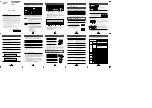
Application
Paper
Effective
March
201
9
Damper control using
PowerXL
DH1
Variable Frequency Drives
Overview
1) During Normal electronic start, Auto and Hand
2) Normal electronic Bypass
3) Bypass mode during Emergency Faults, damper is manually operated.
References:
Description of Operation for each mode:
1) Normal electronic start, Auto and Hand (Local): Sequence of events during this mode:
a. Drive in this mode is controlled in local or remote mode from the drive keypad, with
powers the damper motor to turn the damper.
c. The motion complete of the damper will close the contact DPR-K1, acknowledging
that the damper motion is complete.
d. Closure of the damper position feedback contact DPR-K1 will also pick-up relay R1,
closing the contact R1-K1
e. Closure of DPR-K1 will get the RUN ENABLE to drive, as P2.2.19 is set to DigIN: 8.
f.
With SW1 in VFD position, RUN ENABLE active the drive can be controller to the
required speed reference.
1) PowerXL DH1 Series VFD application manual MN040041
2) PowerXL EHB, EHC, EHD Enclosed installation manual
IL040052EN
SW1 in VFD position
b. When start command is issued to the drive, Relay (RO3) on the drive closes, which
Damper operation with the HVAC applications is a very common requirement, where the
application requires opening the damper BEFORE starting the HVAC fans. This application note
covers damper operation and damper interlock with the DH1 drive in three different modes:
3)
Interlock Delay
: This mode can be used in two instances:
Eaton DH1 supports 3 different modes for damper control. Each mode offers slightly different
sequence of events in terms of the drive control philosophy.
1)
Interlock Start
: This mode is a basic damper control mode where drive controls look for
damper position feedback to put drive into run enable. In an unlikely event of failure to get the
damper position feedback the drive doesn't take any further action.
2)
Interlock Tout
: This mode is used when user would wants drive to fault, in an unlikely
event of failure to get the damper position feedback after a preset time delay.
3.a) When the user does not have a position feedback sensor on the damper and
would like to delay the drive run enable for a preselected time delay, giving enough
time for damper to change the position.
3.b) When the damper position feedback is spurious and user wants drive to ignore the
position feedback (till the issue is fixed) and have drive go to run enable after a
preselected time delay.























